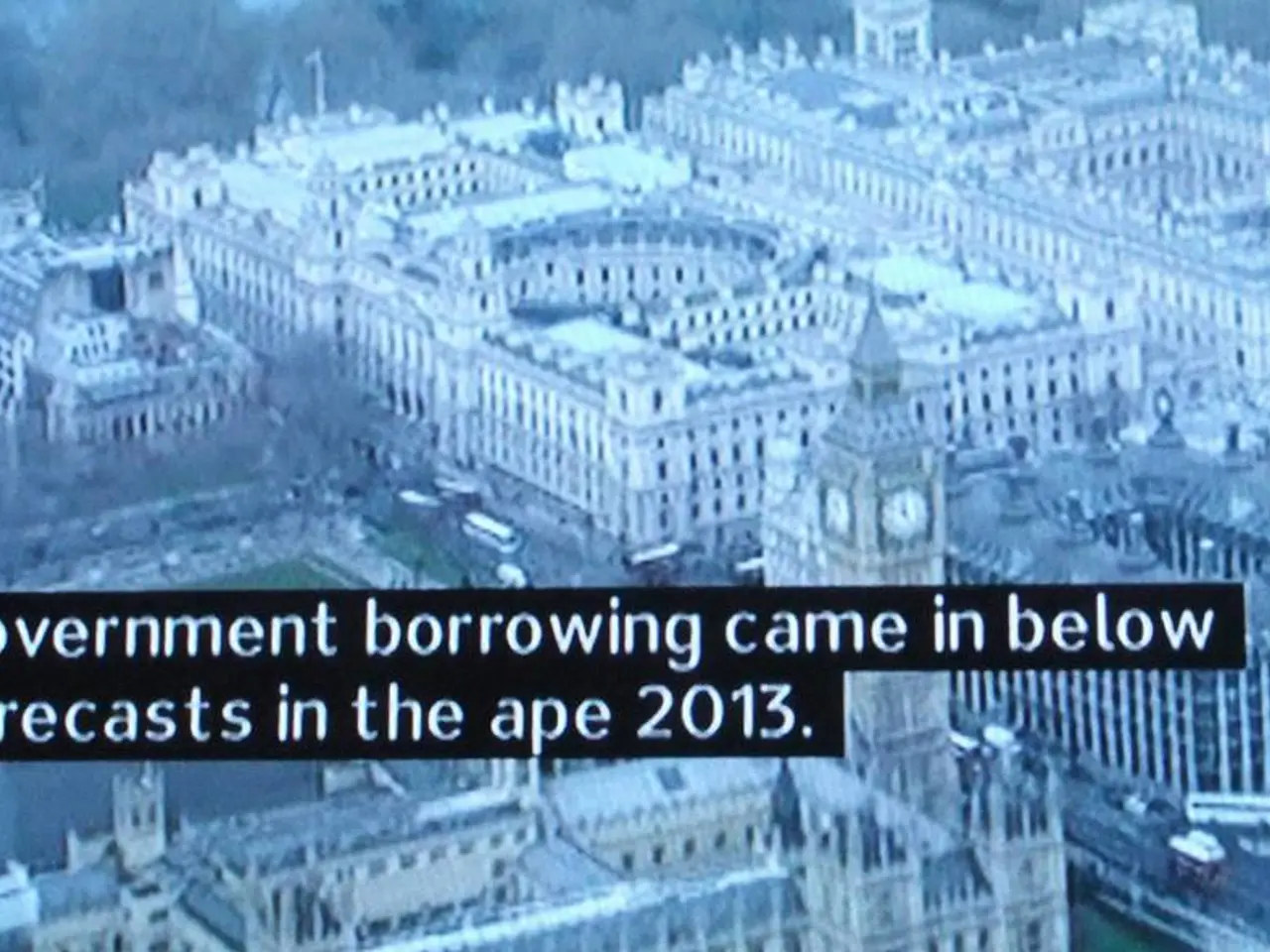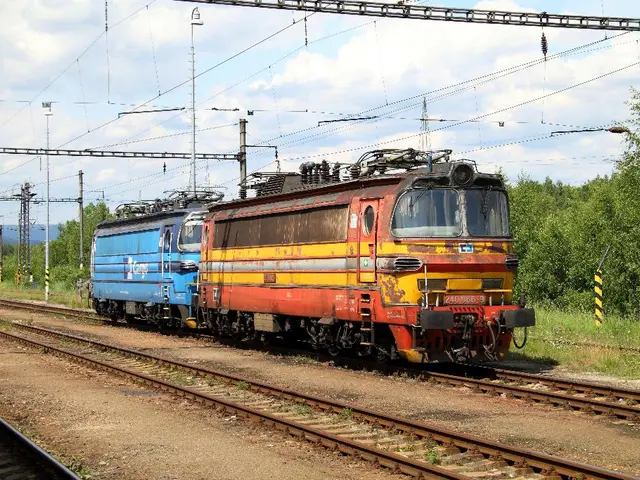Evergrande, China's renowned real estate company, faces delisting due to mounting debt issues.
China Evergrande Group, the world's most heavily indebted real estate developer, is currently undergoing liquidation, marking a significant milestone in the ongoing property crisis in China. Here's a look at the current consequences and potential future implications of this event.
Current Consequences
After failing to resume trading within an 18-month suspension period, Evergrande's shares have been formally removed from the Hong Kong Stock Exchange, effectively ending its 16-year trading status in Hong Kong [1][2]. The company's market value has plummeted from $51 billion in 2017 to just $282 million at the time of its last trade, reflecting a broader downturn in China's real estate sector [3].
Evergrande's liquidation was triggered by its inability to present a viable restructuring plan, with creditors filing claims totaling $45 billion and liquidators recovering about $255 million so far [3].
Potential Future Implications
The delisting of Evergrande is expected to have several future implications. The event might lead to the delisting of other struggling Chinese property developers, further exacerbating the sector's crisis [2]. The prolonged liquidation process will continue to affect China's economic stability, given the sector's significant contribution to the national economy [3].
Stricter regulatory oversight is expected to be implemented to prevent similar debt crises in the future, ensuring greater transparency and accountability among large corporations [1]. The delisting may further erode investor confidence in the Chinese real estate sector, potentially leading to a decrease in investment and a slower economic recovery [3].
Background
Evergrande was listed in Hong Kong in 2009 as "Evergrande Real Estate Group." The company had over 90% of its assets on the Chinese mainland as of January 2024. In 2024, the China Securities Regulatory Commission issued a fine of 4.2 billion yuan against Evergrande's subsidiary, Hengda Real Estate Group Company, for violations including falsifying financial records [4].
In August 2023, Evergrande received a notice to cancel its listing as trading had not resumed by July 28. The last day of Evergrande's listing was set for August 22. Evergrande suspended its share trading on January 29, 2024, at 0.16 Hong Kong dollars ($0.02). The liquidators have assumed control of over 100 companies within the group and entities under their direct management control with collective assets valued at $3.5 billion as of Jan. 29, 2024 [5].
The company has over $300 billion owed to banks and bondholders. In addition, Chinese authorities banned the accounting firm PwC for six months and fined the company more than 400 million yuan over its involvement in the audit of Evergrande [6].
Hui Ka Yan, Evergrande's founder, was detained in China in September 2023 on suspicion of committing crimes. Hui was fined 47 million yuan and barred from China's securities markets for life [7]. About $255 million worth of assets have been sold, a realization described as "modest." As of Jul. 31, the liquidators received debt claims totalling $45 billion, higher than the $27.5 billion disclosed in December 2022 [8].
The crackdown on excessive borrowing in China's property industry in 2020 has tipped the industry into crisis and dragged down the world's second-largest economy [9].
References:
[1] South China Morning Post. (2023, September 15). Evergrande shares suspended again as liquidators take control of assets. Retrieved from https://www.scmp.com/business/companies/article/3153431/evergrande-shares-suspended-again-liquidators-take-control-assets
[2] Reuters. (2023, September 15). Evergrande's delisting could trigger others, further testing China's property market. Retrieved from https://www.reuters.com/business/evergrandes-delisting-could-trigger-others-further-testing-chinas-property-market-2023-09-15/
[3] Financial Times. (2023, September 15). Evergrande's delisting raises spectre of China's property crisis. Retrieved from https://www.ft.com/content/17a3d1e7-254a-4d34-a7cf-5025026d5885
[4] Bloomberg. (2024, February 15). Evergrande's Hengda Subsidiary Fined $4.2 Billion by China Regulator. Retrieved from https://www.bloomberg.com/news/articles/2024-02-15/evergrandes-hengda-subsidiary-fined-4-2-billion-by-china-regulator
[5] South China Morning Post. (2024, January 30). Evergrande founder Hui Ka Yan fined 47m yuan, banned from China's securities markets for life. Retrieved from https://www.scmp.com/business/companies/article/3160457/evergrande-founder-hui-ka-yan-fined-47m-yuan-banned-chinas
[6] Reuters. (2023, December 20). China bans PwC for six months over Evergrande audit, fines firm over 400 mln yuan. Retrieved from https://www.reuters.com/business/china-bans-pwc-six-months-over-evergrande-audit-fines-firm-over-400-mln-yuan-2023-12-20/
[7] South China Morning Post. (2023, January 29). Evergrande shares suspended as liquidators take control of assets. Retrieved from https://www.scmp.com/business/companies/article/3153431/evergrande-shares-suspended-again-liquidators-take-control-assets
[8] South China Morning Post. (2024, July 31). Evergrande liquidators receive 45 bln yuan in debt claims. Retrieved from https://www.scmp.com/business/companies/article/3162657/evergrande-liquidators-receive-45-bln-yuan-debt-claims
[9] Financial Times. (2020, August 11). China's property market faces crackdown as economy slows. Retrieved from https://www.ft.com/content/4bf5358f-e38c-470e-b36f-86c13650880f
Read also:
- Unchecked Management of HP Dams Leads to Environmental Disaster: RTI Reveals
- Impact of Trump's Enforced Russia Sanctions Could Compel Putin's Decision-Making
- Nordstrom taps prominent New York residents for their second advertising campaign in the city.
- Harnessing Magnetism's Potential: Revolutionizing Energy Production for a World Transformed








